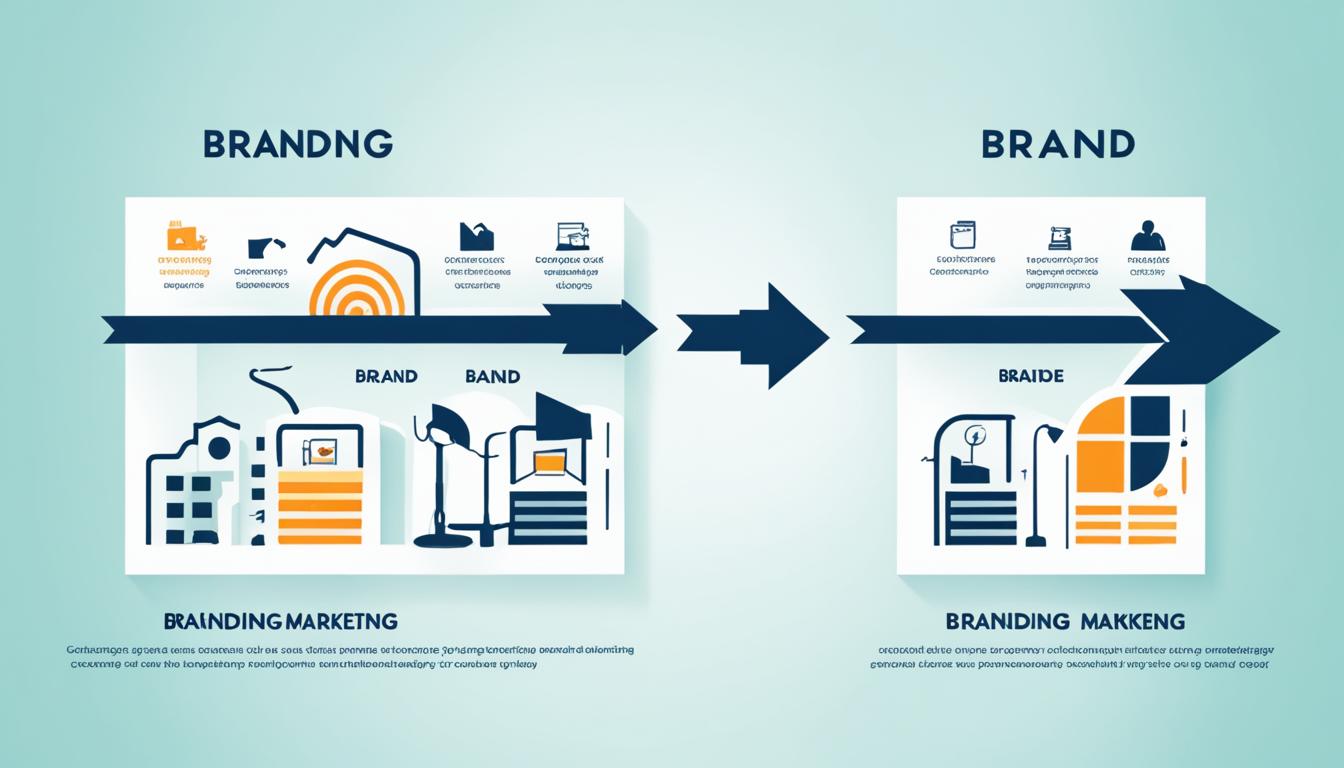Societal marketing is about thinking of society’s welfare in marketing efforts. It aims not just to satisfy consumers but to benefit society too. This means choosing eco-friendly ways to produce, backing social causes, and adopting sustainable practices.
It’s crucial because it helps companies be socially responsible. They can support good causes and meet the demand for ethical behavior. This approach can boost a brand’s image, keep customers coming back, and ensure long-term success.
For instance, The Body Shop is well-known for its stand on human rights. AVON has helped the National Breast Cancer Foundation a lot. Coca-Cola’s ad showcased cultural unity featuring diverse ethnic groups. These are key examples of societal marketing done right.
Key Takeaways:
- Societal marketing considers the welfare of society when making marketing decisions.
- It involves practices such as using environmentally friendly production methods and supporting social causes.
- Societal marketing enhances brand reputation and builds customer loyalty.
- Successful examples include The Body Shop, AVON, and Coca-Cola.
The Origins of Societal Marketing
In the early 1970s, societal marketing came to life as a response to too much consumerism and bad business moves. Big companies with huge advertising spends were accused of pushing products too much. They decided to turn things around by adopting ethical and socially aware marketing methods.
This change was well-received by consumers who wanted something different. Societal marketing was a smart move for companies. It helped them create a better image and boost sales. It’s different from social marketing because it focuses not just on social change but on human welfare, meeting consumer needs, and keeping customers for a long time.
A new marketing approach emerged because people were unhappy with the consumer culture and its bad effects on society. People started questioning the motives of big corporations, leading to a call for more ethical behavior. In turn, companies saw a need to be more socially aware in their marketing.
Being ethical became essential in societal marketing. Companies started caring more about how their actions affected society and the environment. They began using sustainable production methods, supporting good causes, and helping communities. This helped companies connect better with their audiences and build lasting trust.
The drive to buy more and more was pushing societal marketing forward. Too much focus on buying had harmful effects on society and our planet. Societal marketing aimed to fix that by encouraging smarter buying habits. It also helped raise awareness about the downsides of too much consumerism.
The Philosophy of Societal Marketing
Societal marketing is more than just a tactic. It’s a core business philosophy. It guides a wide range of decisions.
At its heart, it tells businesses to put people first in their marketing plans. The goal is to benefit society and still meet marketing needs.
By focusing on people, companies show they care about more than just profits. They make choices that help both individuals and society as a whole. This approach looks at the wider effects of business actions. It ensures they are good for both ethics and society.
Moreover, societal marketing stresses listening to customers’ needs not just their wants. By understanding customers, companies build trust and lasting bonds. This way, they offer products that truly meet consumer needs and improve society.
Long-term customer relationships
Building lasting customer relationships is also key. It helps companies grow their profits. Happy customers keep coming back and recommend the brand to others.
This philosophy helps create a stable base of customers. It lessens the need to always look for new ones. Keeping loyal customers is good for business goals.
Embracing societal marketing brings many advantages. It boosts brand awareness and image. Nowadays, customers prefer brands that stand for ethical values and help society.
It also leads to stronger customer loyalty. When companies truly care for their customers’ welfare, they earn trust. Customers stay with brands that show they care about making a difference.
In the end, societal marketing can drive higher profits and growth. By focusing on welfare, meeting needs, and keeping strong customer ties, companies do well by doing good.
Why Societal Marketing Matters
Societal marketing is essential in today’s business world. Companies now aim to be ethically responsible. They also try to meet the demand for socially responsible products and services. This approach helps build a good brand image, enhances sustainability, and supports long-term profit and risk management.
1. Ethical Responsibility and Positive Contributions
Companies have a duty to the environment and society. They use societal marketing to make a positive impact. This shows their commitment to doing good, improving their corporate image.
2. Consumer Demand for Socially Responsible Businesses
More consumers want products from responsible companies. They are ready to pay extra for such brands. Societal marketing helps businesses attract these customers, aligning sales with consumer values.
3. Building Brand Reputation and Customer Loyalty
Societal marketing boosts a brand’s reputation. It makes businesses stand out by showing their commitment to good causes. This approach leads to loyal customers who support and promote the brand.
4. Promoting Sustainability
This strategy encourages eco-friendly business practices. Companies work to reduce their environmental impact. They focus on sustainability, gaining respect and attracting consumers who value the planet’s health.
5. Achieving Long-Term Profitability
Societal marketing can increase profits over time. Social responsibility often results in cost savings and efficiency. It also attracts customers willing to pay more, boosting sales and revenues.
6. Risk Management and Compliance
It helps with managing risks related to social and environmental issues. Complying with ethical standards reduces the chance of reputational or legal problems. This proactive approach lowers business risks significantly.
Embracing societal marketing is key for growth in today’s market. It assures ethical action, meets consumer demands, enhances brand strength, promotes sustainability, increases profits, and manages risks. Businesses can achieve significant change and growth by following this model.
Societal Marketing Examples: The Body Shop
The Body Shop is known worldwide. It’s a British brand that makes cosmetics, skin care, and perfumes. They stand up for human, civil, animal, and environmental rights. By doing this, they show they care about more than just profit.
The Body Shop pushes for fair trade. They work with suppliers from different communities. This helps people in need get fair wages and grow economically. It’s their way of fighting poverty and supporting fairness.
The company also cares about the Earth. They look for eco-friendly options for their packaging. Using recycled materials is a big part of their plan to lessen waste. This shows how serious they are about protecting our planet.
| Societal Marketing Initiatives | Impact |
|---|---|
| Advocacy for fair trade practices | Contributes to poverty reduction and social justice |
| Promotion of eco-friendly packaging | Reduces environmental footprint and waste |
| Support for various social campaigns | Raises awareness and support for important causes |
Moreover, The Body Shop backs many social causes. They team up with groups that work on human rights and environmental issues. This helps spread the word and gather support for these important topics.
Thanks to their efforts in societal marketing, The Body Shop has become more popular. They attract people who care about human rights and the environment. The Body Shop is a leader, showing how companies can do good in the world.
Image for reference:
Societal Marketing Examples: AVON
AVON, a beauty and cosmetics company, has done great work with societal marketing. A key project is their collaboration with the National Breast Cancer Foundation. They’ve raised millions to help breast cancer research. They achieve this through selling pink ribbons that stand for the cause.
This partnership shows how serious AVON is about being socially responsible. It connects their brand with a significant social issue. AVON doesn’t just sell beauty products; they also focus on making a positive difference in society.
AVON’s work with the National Breast Cancer Foundation doesn’t just bring in money for research. It also educates people on the significance of detecting cancer early. Moreover, it supports those battling cancer and celebrates survivors. AVON shows that societal marketing benefits both companies and important causes.
| Benefits of AVON’s Societal Marketing: | Impacts: |
|---|---|
| 1. Enhanced brand reputation | 1. Increased community support |
| 2. Attracted socially conscious consumers | 2. Improved brand loyalty |
| 3. Differentiated from competitors | 3. Raised awareness about breast cancer |
| 4. Contributed to the National Breast Cancer Foundation’s mission | 4. Empowered patients and survivors |
Societal Marketing Examples: Coca-Cola
Coca-Cola is known worldwide for its drinks. They also have social marketing campaigns that touch people’s hearts. A famous campaign highlighted diversity and unity, showing we are all connected.
Their ad showed people from various backgrounds singing “America Is Beautiful.” This demonstrated the nation’s diversity. Coca-Cola linked their brand to cultural harmony. This move boosted their image and gained customer appreciation.
Their diversity campaign showed Coca-Cola’s commitment to bringing people together. It celebrated cultural harmony. Coca-Cola showed that marketing can connect us.
This campaign made a strong impact on viewers. It also made steps toward a more inclusive world. Coca-Cola used its influence to promote unity, showing how companies can encourage societal growth.
In conclusion, Coca-Cola’s approach shows the power of connecting a brand to social matters. It helps increase brand recognition, build emotional ties, and push for a better community.
| Societal Marketing Example | Brand | Social Issue |
|---|---|---|
| 1 | The Body Shop | Human and civil rights, environmental issues |
| 2 | AVON | National Breast Cancer Foundation |
| 3 | Coca-Cola | Cultural harmony |
| 4 | Kia | Environmentalism |
| 5 | Budweiser | Immigrant founder, pursuit of the American Dream |
Societal Marketing Examples: Kia
Kia, an automobile manufacturer, has adopted societal marketing in its ads. A notable example is their commercial with Melissa McCarthy as an eco-warrior. In the ad, McCarthy tries to save a tree, a whale, and a rhino. She does this while promoting Kia’s new hybrid car.
This campaign shows Kia’s focus on the environment. It also draws in those who care about sustainability. Kia stands out in the car market by using societal marketing in their strategy.
This image underscores Kia’s commitment to green causes. It also makes their marketing more visually striking.
Societal Marketing Examples: Budweiser
Budweiser, a top beer brand, used societal marketing in their 2017 Super Bowl ad. The ad shared the journey of their German co-founder, Adolphus Busch. It highlighted the immigrant experience and the quest for the American Dream.
The ad got various responses but started important talks on immigration. It linked Budweiser with a significant social issue. This shows how societal marketing can spark conversation and truly connect with people.
| Benefits of Budweiser’s Societal Marketing Campaign |
|---|
| 1. Increased brand visibility |
| 2. Engagement with relevant social issues |
| 3. Sparked conversations about immigration |
| 4. Created a deeper connection with consumers |
| 5. Enhanced brand reputation |
Conclusion
Societal marketing helps businesses show they care about social responsibility. It allows them to stand out by supporting important causes. This approach attracts customers who value ethics, boosting brand loyalty.
Brands like The Body Shop and Coca-Cola have seen success with societal marketing. They’ve connected with people on important issues. Their campaigns have left a lasting positive effect on the world.
For societal marketing to work, businesses must be genuine and consistent. Authentic efforts build trust with the audience. When companies include societal marketing in their core values, they not only reach their goals but also help make the world better.




